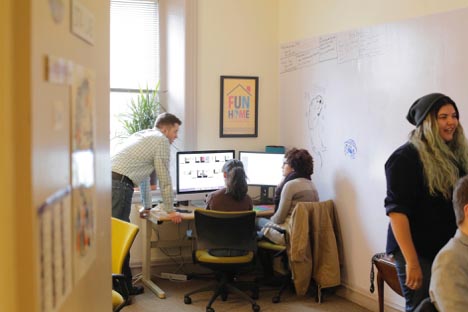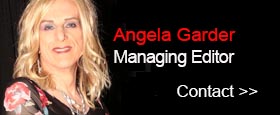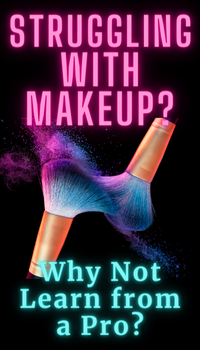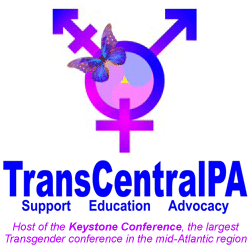Why Preserve Trans Materials?
Over a year ago, I met K. J. Rawson in a parking lot in Connecticut. I gave him about 5 big boxes of material for the TG digital archive project which I planned to retrieve in the spring. I had the opportunity to meet K. J. because I had earlier met Aaron Devor who spoke at a conference I attended. Aaron is from the University of Victoria in British Columbia, Canada and was recently appointed Chair in Transgender Studies at his university; he’s also the Founder and Academic Director of The Transgender Archives. K. J. is no slouch either as he’s an assistant professor at The College of the Holy Cross and is the Director, Digital Transgender Archive.
My task was to find out about these unique archives/libraries and how can we best support them. Note: I tend to use the word “library” but both Aaron and K.J. use the word “archive” so archive it is.
Several years ago, I was asked to reply to Helen Boyd’s 5 Questions so I looked over that and saw she asked about donating TG material to a receptive library so here’s what I said over 10 yrs. ago:
“Question: You recently did all the legwork on getting Felicity’s collection of trans materials to a library and archive. Why do you think it’s important for those libraries to have those magazines and books and papers?
Answer: Felicity is our 100-year-old member and had been very involved in CDing in the ‘60s – ‘80s. She had collected a treasure trove of CD magazines, books, periodicals, etc. When I was just starting (in my teens), I remember looking at some of these magazines realizing there were others like me in the world. I didn’t act upon that until later in life but things like old copies of magazines need to be available to others so they might use them again but also to understand how the TG movement evolved. It’s a history lesson which can be invaluable to understand things. It’s important to save TG history in various forms [of] what’s available. We took about 2 years to determine what would the best place to donate Felicity’s material and why. Several people offered assistance but the bottom line was where would the material serve the most people in a relatively local spot to our group. We eventually chose the National Archive of Lesbian, Gay, Bisexual and Transgender History at the NYC LGBT Center (in NYC).”
Felicity died a couple of years after that. She had a chance to meet the NYC-based librarian and get a sense that they would take care of her collection. She didn’t necessarily understand the reasons to save her material but went with the flow. One of her great quotes I remember is “what would anyone want this stuff for?”
Given that lead in — here’s some questions I’d asked Aaron and K. J. to respond to.
Question.1: What’s your life like? How active and busy are you and what are you most concerned about now?
Aaron Devor: In January 2016 I took up a new position as the world’s only Chair in Transgender Studies. It’s a research position, which means that I spend my time doing research, helping others do research, and working to get the results of research into the hands of people who can use it to make life better for trans and gender variant people. The position also includes some teaching, supervision of graduate student research, and running the world’s largest Transgender Archives. I’ve had a lot of publicity about both of these projects so there have been a huge number of requests for me to become engaged in new projects. This means that I am extremely busy and that I am loving it.
K. J.: Very busy! It’s been a very active past few years of developing and launching the Digital Transgender Archive. I am still working on growing and sustaining the collection.
Question 2: What is the transgender community? How do you manage to be inclusive of everyone who might need support — people transitioning or fully transitioned, or crossdressing, partners, scholars and academics, others?
AD: The trans community is vast. Current estimates put it at 0.5% – 1% of the general population. It encompasses a very wide range of gender variant people who use myriad terms to describe themselves. I recently hosted the second Moving Trans History Forward conference held at the University of Victoria. One of our goals was to bring together as diverse a set of people as possible. The conference spanned four days, Thursday evening to Sunday noon and attracted 175 people, teens to octogenarians, from all across Canada and the US, as well as folks from Mexico, Germany, Sweden, the UK, and Japan. We had a very healthy mix of trans community people, allies, students and academics, and thanks to donations from UVic, the Chair in Trans Studies, and friends of MTHF, we were able to offer over $20,000 in general registration subsidies and travel subsidies for presenters so as to make sure that finances were not a huge barrier to attendance. Once we were assembled I asked people to meet new people, listen more than they talk, and to be kind to themselves and others. I think that it worked out well because almost three-quarters of the people who answered a survey about the conference either said that it was one of the best conferences that they had ever been to (20%), or that it was a great conference (53%).
K. J.: We try to collect materials as widely as we can and we are always looking to represent experiences that are not currently available in the collection. We approach “transgender” not as an identity, but rather as a practice of trans-ing gender. This allows us to collect a wide range of materials related to practices of trans-ing gender that predate the term and that come from places where the term doesn’t make sense.
Question 3: How did you come to be involved in the TG archives project?
K.J.: You can read more about that here. (https://www.digitaltransgenderarchive.net/about/overview)
AD: The Transgender Archives began in 2005 over a quiet luncheon in an intimate out-of-the-way restaurant, in a small city, on one of the world’s largest islands, off the west coast of Canada. As Rikki Swin and I chatted about the fate of the shuttered Rikki Swin Institute, we began the discussions which led her to donate its entire holdings to the University of Victoria Libraries’ Archives and Special Collections. A few years later, while we were still processing that enormous gift, the daughter of Reed Erickson, deceased founder and president of the Erickson Educational Foundation, contacted me about the disposition of her father’s extensive papers, and she chose The Transgender Archives as their new home. The third major component of the Transgender Archives came in 2013 when Professor Richard Ekins donated the entire University of Ulster (Northern Ireland, United Kingdom) Trans-Gender Archive to us. The collection has been further enhanced by numerous other smaller and important contributions.
Question 3b: What do you do?
- Solicit donations of materials and financial contributions.
- Manage donation intake.
- Provide intellectual context for understanding the collections
- Communicate with donors, media, public.
- Host visiting scholars.
- Host Moving trans History Conferences.
- Host many public outreach events.
- Manage several websites and social media outlets
- Research, publish and do public speaking about the Transgender Archives
Question 4: What do you anticipate to be the significance of the effort to save TG history? Why is it important?
AD: I would answer this question with three quotes:
George Orwell said: “The most effective way to destroy people is to deny and obliterate their own understanding of their history.”
The “Universal Declaration on Archives,” issued in 2010 by the International Council on Archives and adopted in 2011 by UNESCO said: “Archives record decisions, actions and memories. Archives are a unique and irreplaceable heritage passed from one generation to another…. They are authoritative sources of information . . . [that] play an essential role in the development of societies by safeguarding and contributing to individual and community memory.”
Confucius said: “Study the past if you would define the future.”
What constitutes the archives?
- 320 linear feet/98 m (the length of a football field) from 17 nations on five continents
- Books
- Newsletters & Magazines from 18 countries
- Pamphlets
- Fantasy fiction
- Organizational records
- Personal papers
- Newspaper clippings files
- Court cases
- Audio recordings
- Movies
- Photographs
- Erotica
- Original art works
- Ephemera
K. J.: Trans history is incredibly significant, particularly in our current moment when so many trans issues are at the center of so many public debates. The DTA is a freely available website that provides quick and easy access to trans-related history.
Question 5: What’s the biggest hurdle and challenge? What’s the most difficult thing about the archives project? What’s the most rewarding?
K. J.: I spend a lot of my time navigating privacy and copyright concerns––these are the two most difficult things to work through in this project. But, it’s all worth it when I hear from people who are using the collection and are deeply appreciative of all they are able to learn from it.
AD: We are now at a crucial time in the history of trans activism and research. The people who initiated the wave of self-conscious trans activism that began in the 1960s are reaching the ends of their lifetimes. We need to preserve their legacies. Doing so is one of the greatest gifts of being able to work on the Transgender Archives. The biggest hurdles lie in finding the funding to do the work properly and at a reasonable pace, and in finding the records of our most marginalized pioneers—people of color, poor people, early trans men, migrants.
Question 6: There are archives all over starting to think about TG history… Are there rules or guidelines or are you making it up as you go?
 AD: There are many rules for archives but none so far for trans archives. We are all figuring it out as we go. For example, how to represent people’s names and genders in archival records? How to make archives feel safe and accessible for community members who are not comfortable in a university library? How to catalogue things using antiquated Library of Congress categories?
AD: There are many rules for archives but none so far for trans archives. We are all figuring it out as we go. For example, how to represent people’s names and genders in archival records? How to make archives feel safe and accessible for community members who are not comfortable in a university library? How to catalogue things using antiquated Library of Congress categories?
K. J.: There are certainly best practices for archives and special collections and often those practices do relate to transgender materials.
Question 7: Who will benefit the most from the archives and why? What’s your constituency who you serve?
K. J.: The DTA is a public resource and it has had visitors from over 100 countries. Our initial development was funded by an ACLS Digital Innovation Fellowship and supported the College of the Holy Cross.
AD: We aim to serve anyone who has an interest in the history of trans activism and research: trans people, students & academics, family members, allies, service providers, journalists…
Who funds this effort?
AD: The Transgender Archives are primarily funded by the University of Victoria, with additional donations from the public. However, we could do so much more, and so much faster were we to have more donations from the public.
Question 8: Has being part of the archives and all you do changed you and your life?
AD: I derive a great deal of satisfaction from being able to serve the community in this way.
K. J.: Yes! It has become the central focus of my work.
Question 9: There are lots of logistics about the archives including distance and proximity to where the community is located. What can you do to help alleviate the problem of location?
AD: We are engaged in digitizing the collections to make them more accessible to the public. This is a costly endeavor and moves very slowly. Donations to fund staffing would make a huge difference.
K. J.: This isn’t a concern for the DTA.
Contact info:
Aaron H. Devor, PhD, FSSS, FSTLHE K.J. Rawson, Ph.D. (he/him/his)
Chair in Transgender Studies
Founder and Academic Director, The Transgender Archives
Professor, Sociology Department Assistant Professor of English
Director, Digital Transgender Archive
University of Victoria College of the Holy Cross
P.O. Box 3025 1 College Street
Victoria, BC V8W 3P2 Worcester, MA 01610, Canada
Phone: +1-250-721-7577
Fax: +1-250-721-6217
Email: ahdevor@uvic.ca
Web: http://transgenderarchives.uvic.ca
Web: http://web.uvic.ca/~ahdevor
Web: http://uvic.ca/transchair
Donate! https://extrweb.uvic.ca/donate-online/transchair
Category: Transgender Community News
















I have about 3000 transgender science articles and looking for a place to archive. I need to clean them up a little first. Who is interested?
Dana, I contacted Aaron Devor who the archive lead at the U. of Victoria and I will try to forward his response to you. You can also contact him directly from his email above. I didn’t want to put his reply in this note. Huggs, Jan